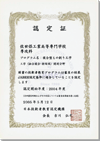

JABEE認定 技術者教育プログラム
本校では、専攻科および準学士(本科)4、5年の4年間の教育課程が、「日本技術者教育認定機構(JABEE)」の審査を受け、平成16年度(2004年度)より国際的な技術者教育プログラムとして認められている。本校専攻科修了生は全員が、国際的に認められた技術者として、技術士一次試験が免除される「修習技術者」の資格を有し、最短で4年後には「技術士」になることができる。
1.教育プログラム名
「複合型もの創り工学」
2.育成する技術者像
グローバル化した社会において、高度化、複合化した工学分野の諸問題を解決して「もの創り」を行うために、各専門分野(機械工学、電気電子工学、情報工学、化学・生物工学)について深い専門性を養いつつ、先進的な他の専門分野の知識と技術も身につける複合的な教育を行うことにより、複眼的な問題解決能力を備えた創造性豊かな、世界に通用する「もの創り技術者」を育成する。
3.学習・教育到達目標
- (A)工学の基礎と専門
- 1)数学(微分積分学、線形代数、微分方程式、確率・統計など)と自然科学(物理、化学など)の基礎知識を身につけて、工学的諸問題の解決に応用できること
- 2)情報技術の基礎知識を身につけて、情報収集、実験データの解析・評価のツールとしてコンピュータを活用できること
- 3)基礎工学の知識を身につけて、複合化したもの創りの実務における工学的諸問題の解決に応用できること
- 4)それぞれの専門分野における"もの創り"のための4つの専門科目群(材料・要素、設計・製造、評価・解析、複合系)の知識を身につけて、"もの創り"に応用できること
- (B) 地球的視点と技術者倫理
- 1) 他の国の歴史的・文化的背景や国際問題に関する基礎知識を身につけて、グローバルな視点でものごとを考えることができること
- 2) 技術が自然や社会に与える影響・効果を理解して、技術者としての責任を自覚できること
- (C) コミュニケーション能力
- 1) 技術的な内容を日本語により文章や口頭で論理的に説明できること
- 2) 相手の質問や意見を聞いて日本語で適切に答えることができること
- 3) 英語による基礎的な内容のコミュニケーションができること
- 4) 基礎的な技術英語の文章を読み書きできること
- (D) 複眼的かつ実践的能力
- 1) 自分で具体的な計画や手順を決めて基礎的な実験を実施し、得られた結果を正しく評価・解析して考察し、論理的に説明できること
- 2) いくつかの専門分野の知識や利用可能な情報・技術・手段を駆使するとともに創造性を発揮して、調査・解析をおこない、解決策を組み立てて実行し、課題を解決できること
- 3) 社会の要求する課題を解決するにあたって、その内容を分析して、計画や方策を複眼的にデザインできること
- 4) 実験、実習、研究、インターンシップなどを通して実践的能力を身につけ、技術者が経験する実務上の問題や課題を理解して適切な対応ができること
- (E) 自主・自立と協調性
- 1) 社会の要請に迅速に対応し、科学技術の進展を先導するため、自主的・継続的に学習できること
- 2) 要求された課題に対して、自立して、あるいは他の人と協力しながら計画的に作業を進め、期限内に終わらせることができること
- 3) 健全な心身を持ち、学内外の人々と協調して行動できること
 4.履修対象者の決定
4.履修対象者の決定本プログラムの履修対象者は、専攻科への入学をもって対象者と決定する。
5.認定分野「工学(融合複合・新領域)」
ENGINEERING EDUCATION
in accordance with JABEE STANDARDS
Having attained certification by JABEE (Japan Accreditation Bo ard for Engineering Education), May 2005, our graduates will be:
- ・Highly-skilled engineers with globally-accepted credentials.
- ・Exempt from intial examinations for Professional Engineers.
- ・Able to attain qualifications for Professional Engineers in four years.
- ・More Marketable in the Workplace.
- ・General and Combined Engineering
1. Program Title Integrated Creative Technology
2. Engineering Talents to be Developed
We develop creative, internationally recognized engineers with the ability and intellectual foundation for solving issues from a global and multilateral viewpoint, by providing specialized engineering knowledge in each field (mechanical engineering, electrical and electronic engineering,and information engineering,chemistry,bioengineering)and by fostering a positive attitude toward integrating advanced engineering knowledge from other fields.
3. Learning and Educational Objectives
Our program has established the following learning and educational objectives, described in (A) through (E). We aim to instill our engineers with:
- (A)
fundamental and specialized knowledge and ability of engineering, for example,
- ― knowledge of engineering of mathematics (Differential and Integral Calculus, Linear Algebra, Differential Equation, Probability and Statistics, Numerical Analysis, Applied Mathematic and so on) and of natural science (physics, chemistry and so on).
- ― fundamental knowledge of information technology and the ability to apply such knowledge to collecting information, analyzing and evaluating data from experiments, and using computers.
- ― fundamental knowledge of engineering and the ability to apply such knowledge to provide solutions to complicated engineering problems.
- ― specialized engineering knowledge in each field (material elements, design & manufacturing, analysis & evaluation, and the integration of this knowledge) and the ability to apply such knowledge to innovate new technology.
- (B) a global viewpoint and ethics as engineers with the ability and intellectual foundation for
- ― considering issues from a global viewpoint through deep understanding of historical and cultural background of each country in the world.
- ― understanding of the effects and impact of technology on society and nature and behaving as engineers considering social responsibilities.
- (C) communicative abilities, such as
- ― the ability to logically explain technical matter in oral or written Japanese.
- ― the ability to give suitable response in Japanese to the questions or opinions of others.
- ― the ability to conduct basic English conversation.
- ― the ability to read and write basic technical English passages.
- (D) multilateral and practical skills to solve issues, such as,
- ― the ability to construct practical plans or procedures independently to carry out basic experiments, to evaluate and analyze correctly the results of the experiments, and to discuss and give logical explanations for them.
- ― the ability to integrate fundamental knowledge and skills in engineering, and to creatively seek solution for tasks.
- ― the ability to design and organize comprehensive solutions to societal needs.
- ― acquiring practical abilities through experiments, practice, research and internship, and developing the ability to cope suitably with practical problems or tasks that engineers face.
- (E) independent, cooperative and well-rounded personalities including
- ― the ability to continue learning on an independent and sustainable basis, in order to cope with societal needs in a timely fashion and to accelerate the promotion of science and technology.
- ― the ability to cope with and accomplish required tasks independently or cooperatively within time limits.
- ― the ability to undertake tasks cooperatively with professionals from other fields.
4. Decidsion Process into the Program
Upon entering the Advanced Course, the students have the status of admitted participants in the program.
5. Field to be Accredited
Engineering (General and Global, New Field)
